The motivational mountaineer who has climbed Everest three times
- Published
Mountaineer, adventurer and motivational speaker, Khoo Swee Chiow looks back on his life story.
Adventurer Khoo Swee Chiow has certainly overcome his childhood fear of heights.
The Malaysian-born Singaporean is one of the world's most prolific mountaineers, who has climbed Mount Everest in Nepal, the world's highest mountain, no less than three times.
He has also conquered K2 in Pakistan, the world's second-highest - and a far more dangerous climb than Everest. On K2, for every 10 people who reach the summit, two people perish in the attempt. This compares with a death rate of four in every 100 on Everest.
When not climbing the world's other tallest mountains, the 50-year-old has trekked to both the North Pole and the South Pole.
And for a bit of a change from cold weather, Mr Khoo holds the world record for the longest journey made on roller skates, travelling 4,176km (2,595 miles) from Vietnam to Singapore.
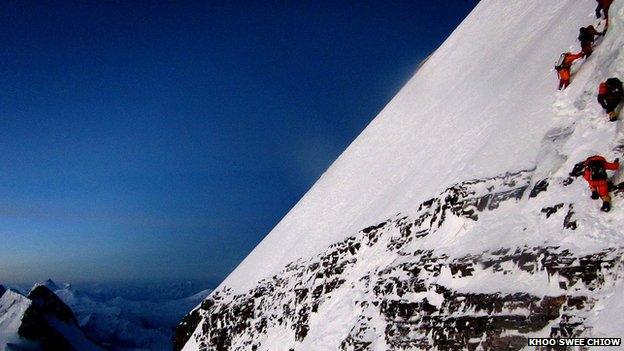
Khoo Swee Chiow and fellow climbers make their way up K2 in 2012
He has also held the record for the world's longest scuba dive, and once swam across the Straits of Malacca between Malaysia and Indonesia.
With such details on his CV (curriculum vitae) or resume, it is little surprise that Mr Khoo - who has written best-selling books about his adventures - is much in demand as a motivational speaker.
Looking back on his life so far, Mr Khoo says he caught the mountaineering bug during the two years he worked in the US.
Where did his journey start?
Born in the Malaysian city of Port Dickson in 1964 to a family of Chinese heritage, Mr Khoo did a degree in computer studies at Melbourne University in Australia, before moving to Singapore in 1987 to work for country's national computer board.
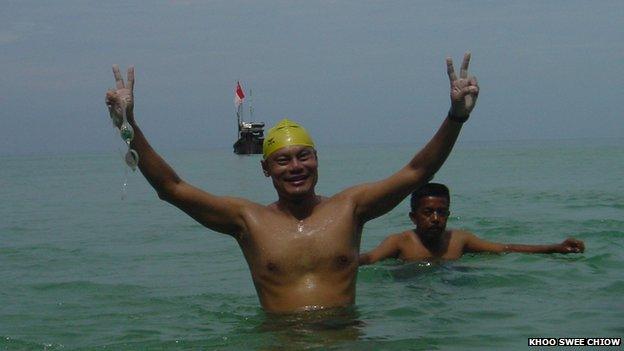
Khoo Swee Chiow doesn't limit his adventures to the world's highest mountains
Two years later he relocated to the US, where he spent 24 months working in Kansas City for the Singaporean travel industry business, Abacus. It was while in the US that he first caught the mountaineering bug.
Mr Khoo says: "That was an interesting two years, where I started to climb mountains.
"Even though Kansas is very flat, nearby is Colorado, the Rockies... that was kind of the first steps towards my adventure life.
"I was so crazy that I would on Friday night leave the office early and drive 10 hours to Colorado, arriving there early in the morning. I'd then grab some sleep and start climbing. And I would arrive back in Kansas on Mondays at 5am, and then go straight to work."
What was his turning point?
With his time in the US allowing Mr Khoo to begin to pick up his mountaineering skills, it was a holiday with friends to Nepal that started an obsession with climbing Everest.
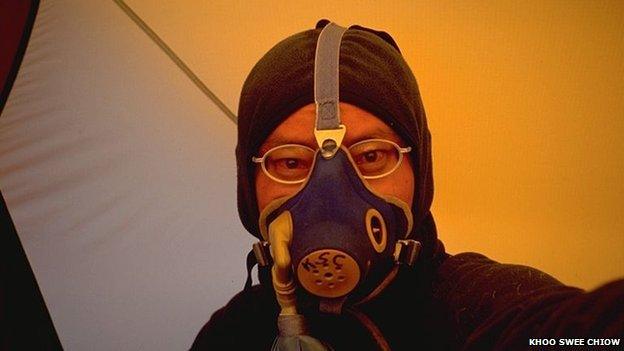
The Singapore team spent three years training to climb Everest
He says: "I only saw Everest on the way back, on the flight. And it was that glimpse of the mountain that ignited that dream in me."
Returning to work and live in Singapore, Mr Khoo continued to improve his mountaineering ability in his holiday time, doing training courses in New Zealand's Southern Alps, and climbing Mount Kilimanjaro.
Then he 1995 he says that "all the elements were in place" for him to help form the first Singaporean team to attempt to climb Everest.
With sponsorship money secured, Mr Khoo and his seven teammates trained for the next three years, before travelling to Everest in 1998.
He says: "We were very excited... but there was anxiety and pressure as well, because we were the first Singaporean Everest expedition. There was high expectation on us to succeed."
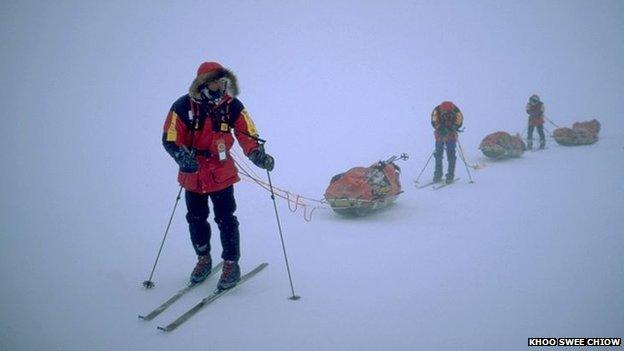
Khoo Swee Chiow tells businesses that team work is vital whether in Antarctica or the board room
While the team's first summit attempt was unsuccessful, having to turn around within 160m of the summit, a week later Mr Khoo and another member of the team were able to get to the top.
"By the time the two of us got to the top I was really tired, it was exhaustion more than exhilaration. But it was [also] a precious moment... a proud one for Singapore."
Ever since that first ascent of Everest Mr Khoo has never looked back, with other expeditions coming thick and fast.
He says: "I think Everest changed everything for me. When I came down from that summit I had a new horizon."
Each expedition is made possible thanks to sponsorship, and as Mr Khoo's profile has grown, he secures a lucrative income from giving regular motivational speeches, and via book sales.
People also pay via his company Dare To Dream to join him on expeditions, or for Mr Khoo to provide his mountaineering advice and guidance.
How does he inspire others?
The demand for Mr Khoo's motivational speeches comes from companies around the world, who want him to talk to their senior managers or staff in general.
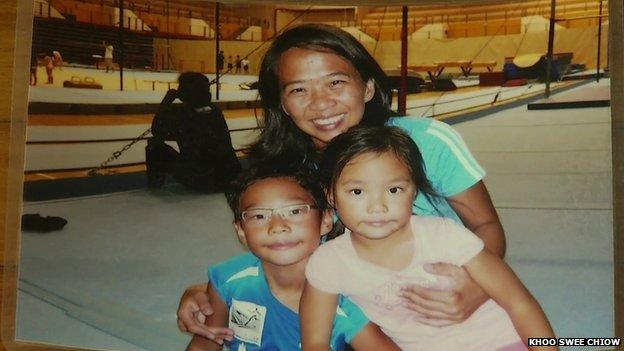
Khoo Swee Chiow's adventures take him away from his family for five months of the year
He says that the firms cross all sectors, "from banks to insurance businesses, IT firms and hotel groups".
Mr Khoo's speeches typically focus on the skills required to climb Everest or K2 - such as teamwork, attention to detail, courage, calculated risk, and planning - and how these are characteristics are equally required in business.
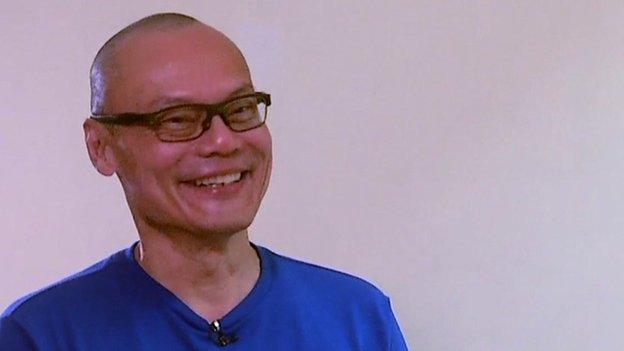
A key topic of Khoo Swee Chiow's motivational talks is how to overcome failure
"Most large companies like to bring in an outsider to give them a different perspective," he says.
"At the corporate level I talk a lot about executing a strategy, and paying attention to the small details, which [on a mountain] can mean life or death. I drive that home a lot.
"But at the personal level, to each person in the audience I also bring the message that life is really short, so make sure you love what you do.
"If you don't love what you do then you won't excel."
How does he deal with failure?
Another key focus of Mr Khoo's talks is to discuss how firms and business people can best recover from failure.
To do this, he recalls his first unsuccessful attempt to reach the North Pole, back in 2001, which ended in him having to be rescued.
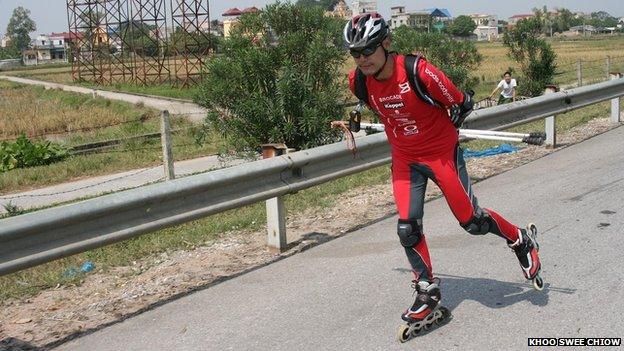
Khoo Swee Chiow's adventures are made possible thanks to sponsorship
"That was one of the lowest points in my life," he says. "I had frostbite to four of my fingers and had to evacuate. If not they would have got really bad, and I would have had to have them amputated.
"For the following three or four months I was depressed... but it became an important learning point in my life."
Mr Khoo says that after three months he realised that it hadn't been a failure, and instead it had been a valuable practice effort for his next attempt on the pole.
"I knew what went wrong the first time, and how to fix it," he says.
So after persuading most of his original sponsors to back him again, he returned to the Arctic a year later, and that time he did successfully get to the North Pole.
He says: "That is what I say in my talks - when you fail, when you fall down, you are actually getting closer to your goal. You just need to get up and continue."